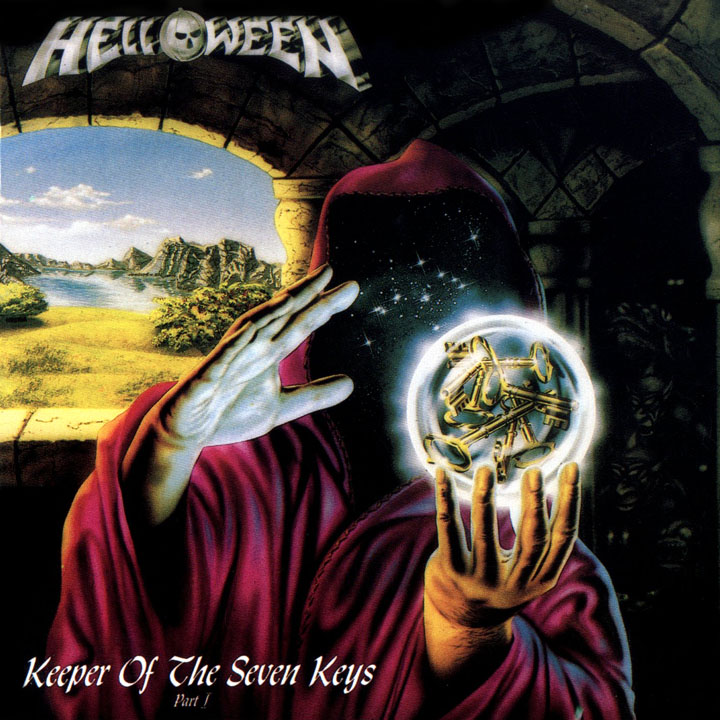 This album has one bad song. All the others are so good that I keep giving “A Tale that Wasn’t Right” chance after chance, convinced that I must be missing out on its genius somehow. But it remains a bad song.
This album has one bad song. All the others are so good that I keep giving “A Tale that Wasn’t Right” chance after chance, convinced that I must be missing out on its genius somehow. But it remains a bad song.
The rest of the tracks are classic German speed/power metal, with lots of riffs, huge choruses, and a pleasant sense of camp. Helloween is the band that can take you on a 14 minute progressive metal journey, and midway through, you get a lyrical reference to Charles Schultz’s Peanuts. The band’s childlike naivete and sense of humor is genuinely refreshing, and set them apart from a metal scene that was already becoming laughably self-serious.
Kai Hansen is a dominating songwriting force here. His high speed-cookers “I’m Alive” and “Twilight of the Gods” are very fast, the former more agitated, the latter more ambitious and story-driven. “A Little Time” and “Future World” are catchy midpaced rockers, the latter having its childlike melodies cut with creepy brainwashed lyrics – this isn’t power metal as much as Jim Jones metal.
“A Tale that Wasn’t Right” dull and sloppy, but Michael Kiske’s piercing voice is somewhat a point of interest. “Initiation” and “Follow the Sign” are little filler instrumentals that help add a little atmosphere between tracks. The Keeper albums aren’t concept albums as such, unless it’s possible to be a concept album without a concept. The only thing uniting them is the uniting them is the vaguely Nostradamus-like character of the Keeper, who has all of time and space floating within his cowl.
The final song is “Halloween” (A plus two E’s), an incredible recap of Helloween’s (three E’s) career to date: heavy Anthrax-esque thrash riffs, speedy tremolo picking, what seems to be several dozen harmonised guitar solos smashing together in a musical clown car collision, and Kiske nailing ungodly high notes. An astonishing blizzard of speed and technicality that pretty much set the bar on what’s possible with power metal – and yet the songwriting is clever enough that it can be condensed into a 5 minute single while still making sense.
The songs are great, and the lasting impression is one of grandeur, fun, and nostalgia. Sad, too. The Keeper of the Seven Keys diptych came too late to launch them to stardom. Come another couple of years and they’d be a band in ruins – destroyed from the inside by a depressed drummer and egomaniac singer, destroyed from the outside by the advent of grunge rock. By the time they recovered, the window of opportunity was gone. They’re still battling on, without Kai, Kiske, or Schwichtenberg, but they never regained what they’d had before.
With this album nearly twenty years old, its touching to remember the band that was king, if only for A Little Time.
No Comments »
 “I was only lengthening the wings on the king’s back.” Jensen explained, in reasonable tones. “I thought that if I could do it – and get away with it – I could provoke an academic discussion about the meaning of the Zuabu Bowl. The longer wings are suggestive of a demon, you see. Not a king.”
“I was only lengthening the wings on the king’s back.” Jensen explained, in reasonable tones. “I thought that if I could do it – and get away with it – I could provoke an academic discussion about the meaning of the Zuabu Bowl. The longer wings are suggestive of a demon, you see. Not a king.”
“The bowl’s been photographed countless times. Everyone would know it’s been changed. Who were you hoping to fool?”
He shrugged but did not argue. Did not even seem to understand. It was as if logic was a seven dollar bill to his mind – untenable, unusable.
Just then, a deputy cracked open the door and poked her head through.
“Superintendent Horowitz? I have an urgent phone call from…”
She waved the girl away without looking at her. “If it’s another important person calling to chew on my ass, tell them to take a metaphorical number, have a metaphorical seat, and then sit the fuck down for a very non-metaphorical wait. I’m interviewing the perp, okay? No disturbances for another hour.”
When they were alone, Dana turned her attention back to him.
“And you’re telling me you’ve done this before? Many times?”
“Yes. All over the world, and in all kinds of places. Archeological digs. Temples Museums. World Heritage sites. It’s incredible how poorly guarded most of them are. And whenever there’s a back turned, or a lock that’s not locked, I get in there and make the world a stranger and more wonderful place.”
“You destroy things. It’s amazing you haven’t been shot by now.”
“No, what’s amazing is the lives I change!” The ridiculous man adopted a Tony Robbins air. “Think of the digs that get funded because of what I do! Think of the journals that stay in print! And think of the countless youngsters who enter academia’s ivory towers because the mysteries I’ve planted at ancient sites…and their brains!”
“No.” She shook her head. “You’re not making this better for yourself at all.”
“I remember how I started down my current path. I was reading about palaeontology, and a strange occurrence in Eastern Colorado. Apparently, Palaeontologist Edward Drinker Cope unearthed a partial vertebra of a massive new dinosaur of the diplodocidae family. If his measurements are accurate and the dinosaur was of the same proportions as other diplodocids, it would have absolutely been the largest creature to ever exist – even bigger than today’s blue whale.
“But nobody knows for sure, because we don’t know where the the vertebra is now – if it even existed. All attempts to locate it have failed, and we can only rely on Cope’s illustrations and his measurements.
“I read about this, and I was suffused with a sense of certainty. It was a hoax, you see. Someone drew up some pictures, and forged Cope’s handwriting and signature. How? Why? I don’t know, but in doing so, he spawned an entire cottage industry trying to locate this giant dinosaur.”
If Dana’s face did not change, it was only because it had hit the bottom of a slippery slope. Complete incredulity.
“I will never know who this man was, but I salute him, and hope to carry on his tradition. I will fake things. I will break things. And in doing so, I will make the world a more exciting and wonderful place.”
“This is ridiculous.”
“It is sublime. It is almost a holy duty. Just last year, I was in Peru, at the old Incan stronghold of Sacsayhuaman. Though there was a sign saying we should not litter, I did leave behind a small rock, inscribed with the syllabary of the Kamakura-era Japan. It was aged to authenticity in my own oven. Come last week, and what do I see?” He jabbed a finger in the air. “A brand spanking new article in PLOS Journal, arguing that there had been trans-Pacific contact between Japan and South America! The author’s knockdown argument? A rock inscribed with Japanese characters at an old relic site. My rock! He wants to finance an expedition to dig up every corpse they can get their hands on and sequence the DNA, and he might just manage it. He should write me a check.”
“Why am I listening to this?”
“I’ve crossed and recrossed the world. I’ve scratched Christian symbols in the palaces of Han Chinese emperors. I’ve planted aged maize in ancient Egyptian tombs. I’ve put Eurasian bird fossils in Australian dig sites. And then I come home, and wait for the mail. I’m subscribed to every relevant journal in existence, and there’s always great delight when my mysteries are uncovered. I long for the sound of the mailman delivering a stack of magazines. That’s my Christmas.”
“Absurd.”
She suddenly found she couldn’t endure this man any more. His enthusiasm seemed to be achieved through vampiric theft of her own.
She summoned a deputy to the office. “Take Mr Jensen and sit him in the holding cell. I have some paperwork to do.”
As he left, he caught one last glimpse of his eyes, at the tidal swells of rapturous happiness contorting his face. A magician loves to perform, even if he does have to reveal his tricks at the end of the show.
She grabbed his psyche file, and started filling it in.
MENTAL DIAGNOSIS? One field asked.
She just wrote “Mystery.”
No Comments »
 This is the kind of game that gets called a “cult classic”. But who wants to be in a cult?
This is the kind of game that gets called a “cult classic”. But who wants to be in a cult?
Released at the eleventh hour of platforming genre, Jazz Jackrabbit 2 sees you controlling the titular character against Devan Shell, a mendacious tortoise who has made the critical mistake of being the villain in a platforming game.
The game takes the concept of the first game and pushes it as far as it will go. Basically, think Sonic, but not as fast. Or think Mario, but a bit more edgy. Visually the game draws heavily from drug-trip psychedelia, and the soundtrack is mostly slap-bass acid funk. JJ2 is basically the hippie era put into a computer game, more so than any other game I know (except maybe Timothy Leary’s Mind Mirror). Jazz doesn’t smoke a bomber joint as part of his idle animation, but I guarantee the artists wanted him to.
You get to play as Jazz or his brother Spaz (Jazz can hover in mid-air like Mario in SMB3, while Spaz can double-jump), collecting jewels and killing enemies with guns, speed-dashes, even your ass (literally). The game simultaneously looks dated yet great. The background is an ever-morphing LSD light show of color, and the lighting effects of muzzle flashes (etc) are simple but dramatic. The hand-drawn sprites are fun and cartoony. You do stuff just to see how the characters will react.
The problem with Jazz Jackrabbit 2 is that it doesn’t seem like much of a game. The single player mode took me about three hours to beat on hard difficulty. The enemies are too easy, and the bosses are rote and predictable – crack the “code” and you can beat them blindfolded and in a body cast. The levels are not very interesting, and don’t invite another play-through.
It does, however, have an extensive multiplayer mode, as well as lavish level-editing and modding tools. Forget Mario or Sonic, this game’s true inspiration is Quake. Epic’s approach was to make a bare-bones product, and throw it over to the fans to put some meat on it. Their bet paid off. JJ2 spawned a community took this game and ran with it, producing all sorts of custom levels, mods, etc, some of which are pretty impressive (tip: download Tomb Rabbit).
The game itself isn’t much. It’s like a shitty movie that has a cult following who analyse every frame. It’s the fans that turned it into a product worth owning – JJ2 isn’t a game so much as a piece of real estate, something that’s only as good as what you’re prepared to do with it.
Don’t get me wrong, there’s a lot of cool stuff in JJ2. But it’s rushed cool stuff, thrown in without much polish or thought. What’s the point of giving the player tons of weapons if most of them are useless? I think I used the pepper spray once and then never touched it again. Even Jazz is pretty useless next to his brother, who can reach all sorts of high places thanks to his double jump. Jazz gets completely upstaged in his own game.
I had some fun with Jazz Jackrabbit 2 back in the day, but I don’t expect to ever play it again. Like the hippie era it pastiches, it came and went, leaving only memories. It still has a dedicated following, but somehow the Kool Aid wasn’t strong enough in my case.
No Comments »
 This album has one bad song. All the others are so good that I keep giving “A Tale that Wasn’t Right” chance after chance, convinced that I must be missing out on its genius somehow. But it remains a bad song.
This album has one bad song. All the others are so good that I keep giving “A Tale that Wasn’t Right” chance after chance, convinced that I must be missing out on its genius somehow. But it remains a bad song.

